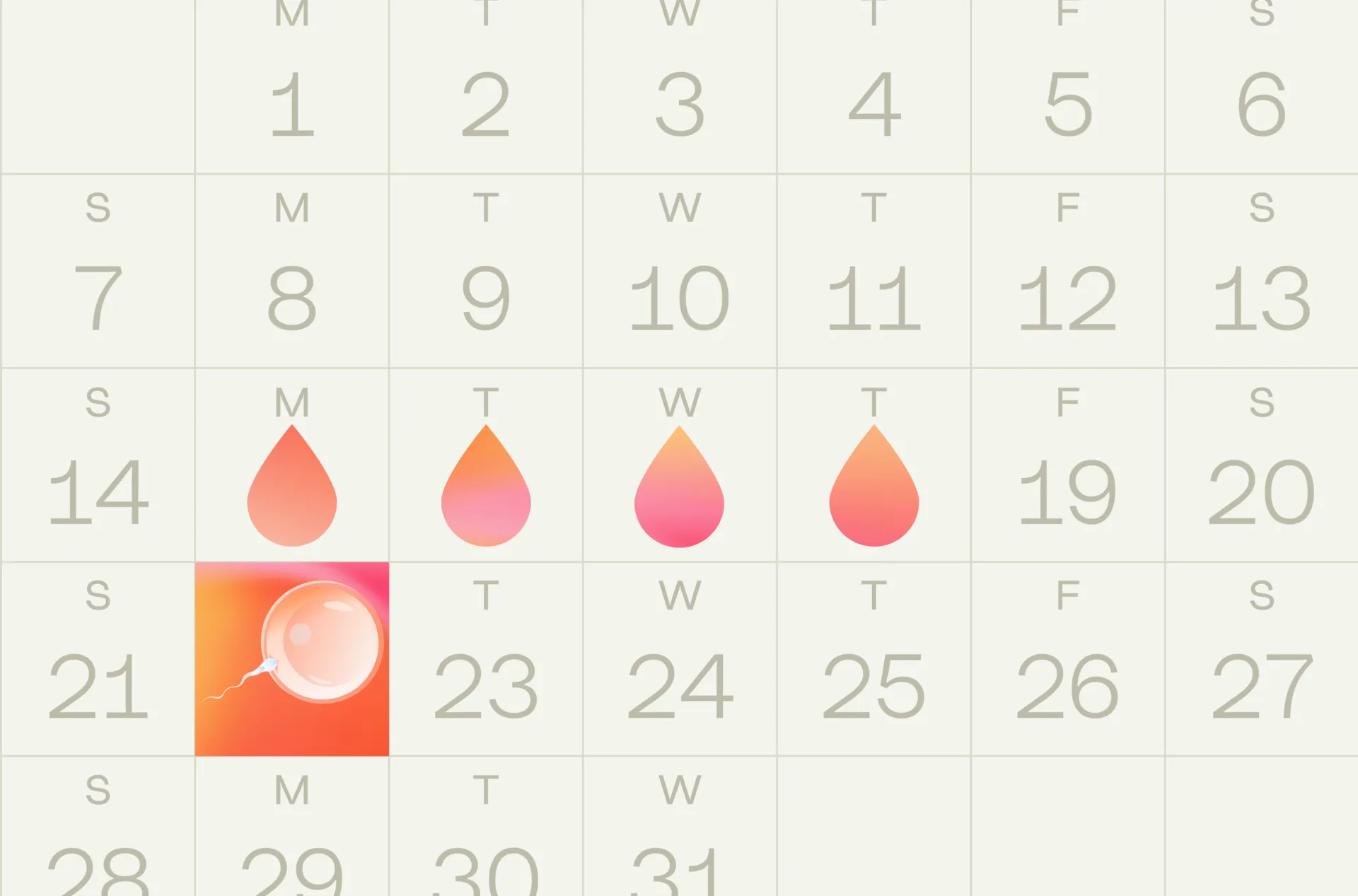Content table
Have you ever noticed a little bit of blood after having sex? It can be a bit scary. And you might be wondering, “Why am I bleeding during sex or bleeding after sex?”
You’re not alone. This is something that happens to many people.
In fact, studies show that bleeding after sex can affect about 0.7-9% of people with periods. It’s also called postcoital bleeding.
It’s important to figure out why it’s happening. So, let’s talk about some of the most common causes of post-sex bleeding.
Key Takeaways
- Bleeding during or after sex is fairly common. But a doctor should check it to find the cause.
- Postcoital bleeding can happen for simple reasons..
- Lack of lubrication and vaginal dryness are the more frequent reasons for bleeding. Both cause small tears in the vaginal walls.
- Infections (including STIs and PID) can also lead to bleeding. So can noncancerous growths like polyps.
- Infections can come with other symptoms like abnormal discharge, pain, and fever.
- Postcoital bleeding is usually minor and stops quickly. But if it’s heavier and persists, seek medical attention. It could mean something more.
- A doctor will likely do a pelvic and physical exam and may run tests to figure out why you’re bleeding.
What can Cause Bleeding During or After Sex?
There are a few reasons why you might experience bleeding during or after sexual activity.
Sometimes it’s something simple. But other times, it might require a check-up from a healthcare professional.
Reason #1: Lack of lubrication
One of the most common causes of postcoital bleeding is not having enough lubrication. Think of it like rubbing two dry things together. It can cause friction and irritation.
When a penis or a sex toy goes into the vaginal canal without enough wetness, it can rub against the vaginal wall. This can cause small tears. If the penetrative sex is rough or fast, this becomes even more common.
Why might there not be enough lubrication? Here are a few reasons:
- Not aroused enough: Not fully aroused before vaginal penetration? Your body might not produce enough natural fluids.
This is called a lack of arousal or premature penetration.
- Changes during life: As women get older, their bodies make less estrogen. This is especially true around perimenopause and menopause.
Estrogen helps keep the vagina healthy and moist. When estrogen levels drop, it can lead to dryness.
When the vagina becomes thinner and drier due to low estrogen, it’s a condition called vaginal atrophy. This is the second biggest problem for women after menopause. (The first is hot flashes.)
About 75% of women experience vaginal dryness after menopause.
Know more: Perimenopause Spotting When Wiping: Is it Normal?
- Other times in life: Breastfeeding can also cause lower estrogen levels and dryness of the vagina.
Additionally, some health problems, like Sjögren’s syndrome (an autoimmune condition where the body attacks the moisture-producing glands) can make it difficult for your body to produce lubricant fluid.
If your postcoital bleeding is due to vaginal dryness, you might notice other symptoms. These include vaginal irritation and pain during sex.
One study found that about 15% of women who had postcoital bleeding also felt pain during sex.
Before you get too worried about bleeding after sex, it’s important to understand what’s causing it. Sometimes you may just not be aware of your bleeding patterns, and this is where tracking your symptoms can be helpful.
The free Inito app, which attaches to the Inito Fertility Monitor, makes this easy. You can log 20+ symptoms on the app, and this can help you see if your bleeding is related to your period, ovulation bleeding, or something else. All this information can be super helpful when you’re to understand what’s actually going on in your body.
Reason #2: Hormonal changes from birth control
Have you recently started using hormonal contraception or switched to a new type? You might experience postcoital bleeding.
This is because the hormones in birth control can cause changes in your bleeding patterns as your body gets used to the new hormones.
The light bleeding after sex or spotting usually stops after 3-6 months. If the bleeding after sex continues for longer than that, it’s a good idea to talk to your doctor. They might need to adjust your dose or suggest a different kind of birth control.
Know more: How Soon After Stopping Birth Control Can You Get Pregnant?
Reason #3: Infections
Sometimes, bleeding during sex can be a sign of an infection.
Sexually transmitted infections (STIs) and pelvic inflammatory disease (PID) can cause the cervix and uterus to become inflamed.
When these areas are swollen and irritated, they are more prone to bleeding during vaginal penetration.
Pelvic inflammatory disease (PID) is often caused by untreated STIs that have spread to the uterus, fallopian tubes, and ovaries.
Along with vaginal bleeding, other symptoms of infection might include:
- Itching and irritation around your vagina (the vulvar region)
- Sores or bumps in the vulvar area, or even genital sores
- A vaginal discharge that smells bad
- Bleeding in between your regular periods
- Pain during sex or pelvic pain
- Fever
It’s important to get medical attention for infections. If they aren’t treated, they can lead to more serious problems like:
- Abscesses
- Scar tissue
- Difficulties getting pregnant
Sometimes, common vaginal infections like bacterial vaginosis or yeast infections can also cause irritation that leads to light bleeding. This is especially true after sex.
Reason #4: Polyps on your cervix or uterus
Noncancerous polyps can also cause bleeding after sex.
A polyp is a small growth that can form on the cervix or the inner lining of the uterus. On the cervix, they’re called cervical polyps. And on the inner uterine lining, they’re called endometrial polyps.
These are benign growths, meaning they are not cancerous. Endometrial polyps have been linked to about half of all cases of abnormal uterine bleeding.
They seem to be related to having more estrogen in the body compared to progesterone. Common symptoms of polyps can include:
- Bleeding between periods
- Heavy periods
- Bleeding during or after sex
- Irregular bleeding patterns
Know more: The 8 Types of Abnormal Menstruation You Should Know About
Another condition called cervical ectropion can also cause bleeding. This happens when the glands that usually line the inside of the cervical opening grow on the outer surface of the cervix. This area can be more delicate and prone to bleeding during sex.
Cervical ectropion is usually harmless. It’s often caused by hormonal fluctuations, like when you’re using contraception or during pregnancy.
You might also have:
- Spotting between periods
- More vaginal discharge
- Mild pain
It usually goes away on its own.
Reason #5: Endometriosis
Endometriosis is a condition where tissue similar to the inner lining of the uterus grows outside of it.
This tissue can then become irritated and inflamed during sex, which can lead to bleeding.
Other symptoms of endometriosis are:
- Pelvic pain that gets worse during periods
- Abnormal bleeding (heavy bleeding or
- bleeding between periods)
- Pain during sex
- Pain when using the bathroom
- Fertility problems
Know more: Your Guide to Getting Pregnant With Endometriosis
Reason #6: Changes in the cervix
Sometimes, changes in the cells of the cervix can cause bleeding.
In very rare cases, bleeding after sex can be a sign of cervical cancer. This is why it’s so important to have regular pap smear tests. They check for abnormal cells on the cervix.
Reason #7: Other causes
There are a few other less common reasons for postcoital bleeding
- First-time blood sex: It’s common for people to experience bleeding the first time they have penetrative sex. This is due to the hymen stretching. It’s usually light bleeding and should stop quickly.
- Trauma or injury: Injury to the vagina from accidents or even sexual abuse can cause vaginal bleeding.
- Bleeding from other areas: What looks like vaginal bleeding might actually be something else. It could be blood coming from somewhere else, like hemorrhoids if you’ve had anal sex.
How Long Does the Bleeding Usually Last?
If the bleeding is just a few drops and stops quickly? Then it might be due to something simple like not enough lubrication, vaginal dryness, or hormonal changes from birth control.
This kind of light bleeding usually doesn’t last long.
However, if the bleeding is heavier or lasts more than a few minutes? It could be a sign of a more serious underlying condition that needs medical attention.
When Should You See a Doctor for Bleeding After Sex?
It’s always a good idea to talk to a healthcare professional if you experience bleeding during or after sex.
This is even more true if:
- You’re on birth control and are still having abnormal bleeding after more than 6 months
- You have a fever
- Your discharge smells bad or looks unusual
- You’re bleeding in between your regular periods
- You’re past menopause (post-menopausal bleeding)
- You have pelvic pain
- You have a family medical history of cancer
- Heavy bleeding
- You have other symptoms like genital sores or severe itching
During a visit, your doctor will likely ask about your medical history and your symptoms. They will also probably do a pelvic and physical exam. This might include looking at your vagina and cervix. You may also have a pap smear to check for abnormal cells on your cervix. This also tests for sexually transmitted infections.
In some cases, your doctor might recommend other tests. This may allow them to figure out the obvious cause of the bleeding.
It’s always better to err on the safe side and check to make sure everything is okay.

FAQs
There are a few reasons why you might be bleeding during sex. The most common causes include:
- Not having enough lubrication
- Hormonal changes from starting or switching contraception
- Infections
- Growths on your cervix or uterus
Less common reasons include:
- Tears in the vagina
- Changes in the cells of your cervix
- Cervical cancer (very rare)
It’s best to talk to a doctor to find the exact cause.
Bleeding between your regular periods can have several causes.
It could be due to:
Hormonal changes from birth control
- Ovulation bleeding
- Implantation bleeding
- Infections
- Polyps on your cervix or uterus
Bleeding that isn’t your regular period bleeding is considered abnormal uterine bleeding.
It can be caused by things like we mentioned above:
- Infections (including STIs)
- Noncancerous growths (polyps or fibroids)
- Issues with your cervix
Postcoital bleeding is relatively common. Sometimes it’s due to minor issues like insufficient lubrication or hormonal changes.
However, it can also be a sign of something that needs medical attention, like an infection or growth. If it happens regularly or is heavy, see a doctor.
If the bleeding is just a few drops, it will usually stop on its own.
If it’s heavier or continues, you should see a doctor. They can recommend proper treatment to stop the bleeding. This depends on the underlying condition.
Don’t try to self-treat persistent or heavy bleeding!
Wait until all symptoms of the infection have completely gone away before having sex.
This usually takes a few days to a week after starting treatment.
Having sex while you still have a yeast infection can cause more irritation and discomfort. It could also prolong the healing process.
Follow your doctor’s advice on when it’s safe to resume having sex.












